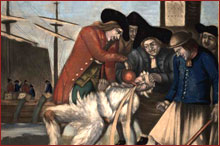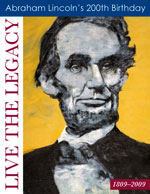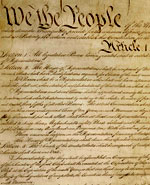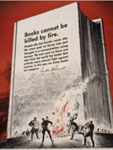Assuming the Historian's Chair
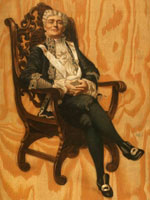
The Chicago History Project (CHP), focused on significantly increasing the depth of historical content and the integration of historical thinking skills in middle and high school American history courses. CHP promoted this scholarly approach in several ways, particularly in the Historian's Chair sessions introduced during the summer institute in the 2nd year of the project.
This aspect of the summer institute was modeled after the Author's Chair strategy used to assist in developing students' writing. The strategy required each participant to don the role of the historian and participate in "doing history." The Historian's Chair sessions emphasized developing scholarly arguments based on secondary and primary sources, applying them to a lesson for students, and then presenting the research supporting the lesson to a seminar group of fellow teachers and a historian facilitator.
The Historian's Chair sessions allowed teachers to enter into a community of inquiry and in this case the scholarly community of historians. According to Seixas (1993), being a part of such a community can enhance a teacher's understanding of historiography and the practice of history.
In these sessions, teachers learned from an experienced historian in the field as well as one another as they presented their historical arguments and received feedback from the historian-facilitator and their colleagues. In this forum, teachers received feedback on the selection of their documents and how well those documents supported the lesson. One teacher commented that these sessions "gave me insight on how to teach different eras/themes in history. The various readings refreshed my knowledge."
The consistently high ratings for the Historian's Chair sessions indicated teachers' appreciation for the focus on historical knowledge and analysis integrated with a focus on teaching history. On average, participants in the second and third years (n=45) rated the value of these sessions at 3.7 (on scale of 1 to 4 with 4 being "very valuable").
Self-reports by teachers support Barton and Levstik's (2004) assertion that in-depth experiences and projects that offer teachers an opportunity to examine the epistemology of historical knowledge may have a significant impact on their pedagogical content knowledge. Indeed the deep engagements with history through the seminars as well as developing research-based lesson plans, especially in the later cohorts, affected how CHP teachers understood history, historical research, and the teaching of history. The final survey data also showed that an overwhelming majority of teachers (96%) across the three cohorts (n=65) indicated that their involvement in CHP affected their thinking about the discipline of history, most commonly by raising the importance of primary source analysis (48%).
Teachers from all three cohorts consistently identified the use of primary sources and the integration of those sources into the teaching of history as one of the major contributions to their enhanced understanding of American history, and some teachers elaborated further on the ways CHP affected their understanding of history. They noted that the summer institute experience changed their way of thinking about historical interpretation and mentioned the need to focus on historical methods, keep up with new historical scholarship, and evaluate authors' biases. Others noted the importance of critiquing historical interpretations, examining the evidence underlying interpretations, and recognizing the tentativeness of historical interpretations.
One teacher noted that CHP "changed my views on using secondary sources in my class. I really believe that incorporating scholarly arguments into lessons is important." In responding to how CHP affected their thinking about history, one teacher stated, "[t]o not to be afraid to expect students to do more rigorous tasks and think more critically. To get them to be like historians, not just read a textbook [and] answer comprehension questions." For this teacher, the in-depth historical work of CHP translated into higher expectations and plans for deeper engagements with history for students.
Keith Barton and Linda Levstik, Teaching History for the Common Good (Mahwah, NJ: Lawrence Erlbaum Associates, 2004).
Peter Seixas, "The Community of Inquiry as a Basis for Knowledge and Learning: The Case of History," American Educational Research Journal 30, no. 2 (1993): 305-324.
